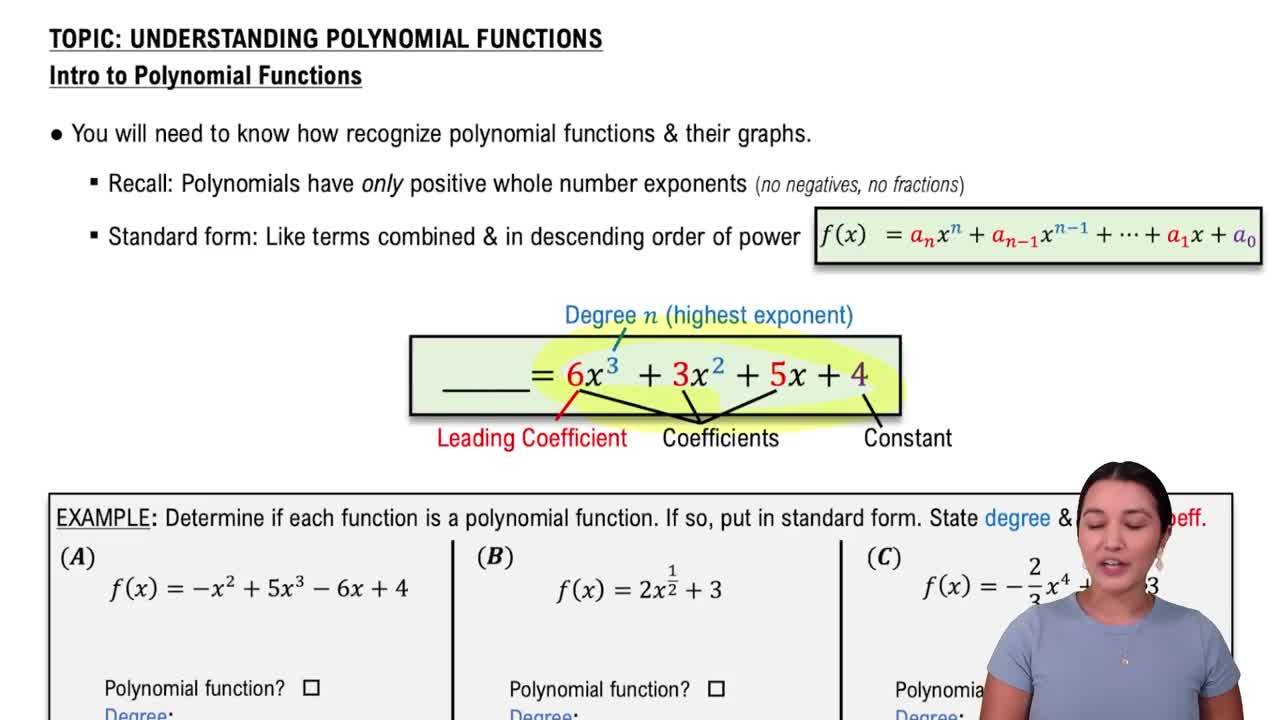Table of contents
- 0. Review of Algebra4h 16m
- 1. Equations & Inequalities3h 18m
- 2. Graphs of Equations43m
- 3. Functions2h 17m
- 4. Polynomial Functions1h 44m
- 5. Rational Functions1h 23m
- 6. Exponential & Logarithmic Functions2h 28m
- 7. Systems of Equations & Matrices4h 6m
- 8. Conic Sections2h 23m
- 9. Sequences, Series, & Induction1h 19m
- 10. Combinatorics & Probability1h 45m
4. Polynomial Functions
Dividing Polynomials
Problem 45b
Textbook Question
For each polynomial function, use the remainder theorem to find ƒ(k). ƒ(x) = 6x^4 + x^3 - 8x^2 + 5x+6; k=1/2
 Verified step by step guidance
Verified step by step guidance1
Identify the polynomial function \( f(x) = 6x^4 + x^3 - 8x^2 + 5x + 6 \) and the value \( k = \frac{1}{2} \).
According to the Remainder Theorem, \( f(k) \) is the remainder when \( f(x) \) is divided by \( x - k \).
Substitute \( k = \frac{1}{2} \) into the polynomial function: \( f\left(\frac{1}{2}\right) = 6\left(\frac{1}{2}\right)^4 + \left(\frac{1}{2}\right)^3 - 8\left(\frac{1}{2}\right)^2 + 5\left(\frac{1}{2}\right) + 6 \).
Calculate each term separately: \( 6\left(\frac{1}{2}\right)^4, \left(\frac{1}{2}\right)^3, -8\left(\frac{1}{2}\right)^2, 5\left(\frac{1}{2}\right), \) and the constant term 6.
Add all the calculated terms together to find \( f\left(\frac{1}{2}\right) \).
Recommended similar problem, with video answer:
 Verified Solution
Verified SolutionThis video solution was recommended by our tutors as helpful for the problem above
Video duration:
2mPlay a video:
Was this helpful?
Key Concepts
Here are the essential concepts you must grasp in order to answer the question correctly.
Polynomial Functions
A polynomial function is a mathematical expression involving a sum of powers in one or more variables multiplied by coefficients. The general form of a polynomial in one variable x is given by f(x) = a_n*x^n + a_(n-1)*x^(n-1) + ... + a_1*x + a_0, where a_n, a_(n-1), ..., a_0 are constants and n is a non-negative integer. Understanding the structure of polynomial functions is essential for applying various theorems and methods in algebra.
Recommended video:

Introduction to Polynomial Functions
Remainder Theorem
The Remainder Theorem states that when a polynomial f(x) is divided by (x - k), the remainder of this division is equal to f(k). This theorem simplifies the process of evaluating polynomials at specific points, allowing us to find the value of the polynomial at k without performing long division. It is particularly useful for quickly determining function values and analyzing polynomial behavior.
Recommended video:

Higher Powers of i
Evaluation of Functions
Evaluating a function involves substituting a specific value into the function to determine its output. For polynomial functions, this means replacing the variable x with a given number, such as k in this case. Understanding how to evaluate functions is crucial for applying the Remainder Theorem and finding specific values of polynomials, which is a common task in algebra.
Recommended video:

Evaluating Composed Functions
Related Practice
